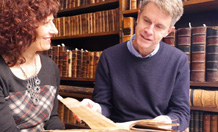
Professor Andrew McRae with Professor Paulina Kewes. Picture by Historyworks.
Stuart era brought to life for pupils
In the year of Queen Elizabeth’s ninetieth birthday, research by the universities of Exeter and Oxford reveals the dramatic paths to power taken by her predecessors in a far more turbulent period of British history.
Stuarts Online is a rich resource that brings scholarship on the Stuart era to a wider audience. In response to an increasing emphasis on the Stuarts in the national curriculum – and also broad public interest – a team of experts has produced new resources which illustrate the enormous political and cultural changes which redrew the shape of modern Britain.
Stuarts Online includes twenty short films – each centred on a key text or artefact – which explore the stories, conflicts and personalities central to the history of Britain from 1603 to 1714. It also provides lesson plans, biographies, timelines, and other learning resources. The films are enriched by privileged access to the holdings of the Ashmolean Museum and the Bodleian Library, of the University of Oxford.
These resources help to explain how James VI of Scotland positioned himself as Elizabeth’s heir, and how his succession was registered in speeches, pageants, and even Shakespeare’s Hamlet. The films focus on moments of crisis and transition – including two revolutions – that reveal so much about the British people and their nations.
Website users can also learn about the key media of the time that helped to shape public opinion. The seventeenth century saw the birth of the newspaper, while ballads and scurrilous pamphlets projected competing images of monarchy. The grand tradition of royal commemorative porcelain, meanwhile, can be traced to the Delftware of the late seventeenth century.
Andrew McRae, Professor of Renaissance Studies and Head of English at the University of Exeter worked on the project alongside Professor Paulina Kewes and Dr Joseph Hone from the University of Oxford, Dr John West from the University of Nottingham, and Exeter PhD student Anna-Marie Linnell.
Professor McRae said: “In the course of a collaborative research project on Stuart succession writing – concerned with all the extraordinary wealth of material published to mark the transition from one reign to another – the team became aware of the value of bringing some key texts and narratives into the public domain. We wanted to use open-access digital resources to inform the public appreciation of this pivotal era in British history.”
Professor Kewes said: ‘This website is a unique way to get the latest high-quality academic research on the Stuarts directly into the hands of teachers and students to support their studies of the period in schools. Our interactive materials let people interested in the Stuarts hear directly from experts in the field talking passionately about their research.’
Stuarts Online is funded by the Arts and Humanities Research Council, and developed by the universities of Exeter and Oxford in partnership with the Ash¬molean Museum, the Bodleian Libraries, the Historical Association, and the Shakespeare Birthplace Trust.
Date: 20 May 2016
